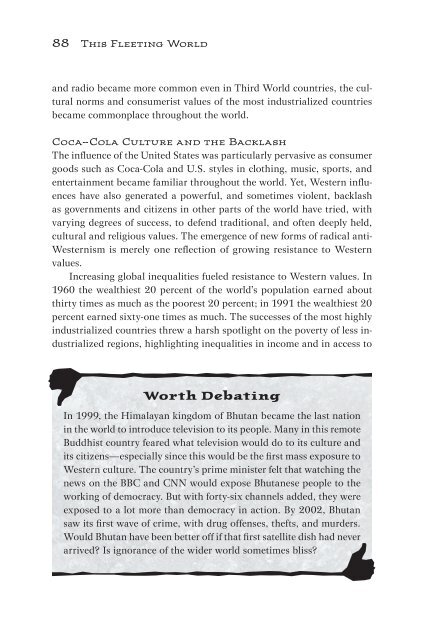This Fleeting World
This Fleeting World
This Fleeting World
You also want an ePaper? Increase the reach of your titles
YUMPU automatically turns print PDFs into web optimized ePapers that Google loves.
88 <strong>This</strong> <strong>Fleeting</strong> <strong>World</strong><br />
and radio became more common even in Third <strong>World</strong> countries, the cultural<br />
norms and consumerist values of the most industrialized countries<br />
became commonplace throughout the world.<br />
Coca-Cola Culture and the Backlash<br />
The influence of the United States was particularly pervasive as consumer<br />
goods such as Coca-Cola and U.S. styles in clothing, music, sports, and<br />
entertainment became familiar throughout the world. Yet, Western influences<br />
have also generated a powerful, and sometimes violent, backlash<br />
as governments and citizens in other parts of the world have tried, with<br />
varying degrees of success, to defend traditional, and often deeply held,<br />
cultural and religious values. The emergence of new forms of radical anti-<br />
Westernism is merely one reflection of growing resistance to Western<br />
values.<br />
Increasing global inequalities fueled resistance to Western values. In<br />
1960 the wealthiest 20 percent of the world’s population earned about<br />
thirty times as much as the poorest 20 percent; in 1991 the wealthiest 20<br />
percent earned sixty-one times as much. The successes of the most highly<br />
industrialized countries threw a harsh spotlight on the poverty of less industrialized<br />
regions, highlighting inequalities in income and in access to<br />
Worth Debating<br />
In 1999, the Himalayan kingdom of Bhutan became the last nation<br />
in the world to introduce television to its people. Many in this remote<br />
Buddhist country feared what television would do to its culture and<br />
its citizens—especially since this would be the first mass exposure to<br />
Western culture. The country’s prime minister felt that watching the<br />
news on the BBC and CNN would expose Bhutanese people to the<br />
working of democracy. But with forty-six channels added, they were<br />
exposed to a lot more than democracy in action. By 2002, Bhutan<br />
saw its first wave of crime, with drug offenses, thefts, and murders.<br />
Would Bhutan have been better off if that first satellite dish had never<br />
arrived? Is ignorance of the wider world sometimes bliss?


